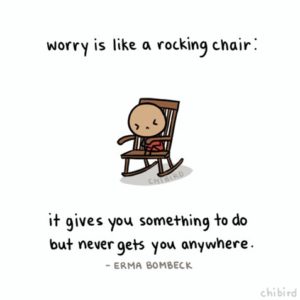
Worrying not only makes life unpleasant but it can derail us from our success. The secret to worrying less is knowing what does and doesn’t matter to us. Find out the three steps that you can take to eliminate petty concerns and stop worrying. (Estimated reading time: 5 minutes)
“You don’t have to care about everything around you. Some things are best to be left ignored.”
— Unknown
Let’s face it – many of us are guilty of worrying too much at some point. But, it’s not something we should be ashamed of. It’s just part of human nature. The same mental processes that have helped us advance as a species can also drive us over the edge, if not managed wisely.
We’ve all experienced the effects of an overactive mind – when our fears escalate to a point where they take on a life of their own. A simple spark can lead to a forest fire that consumes us with the flames of worry. We play out worst case scenarios in our minds, most of which will never come to pass. For this reason, we find it hard to stop worrying.
Why is it so hard to control our racing thoughts and thumping heart when we get caught up in this frenzy? It’s because, at the root of our unease, is a fear of losing control. Our fear deludes us into thinking that we can somehow conquer the unknown by entwining it with our thoughts.

Given all the uncertainty and competition that we have to endure, our concerns are justified. We can’t afford to rest on our laurels and stay in denial if we wish to live up to our potential. Engaging in constructive problem-solving allows us to be focused and mindful of our choices.
However, it’s important to know when to draw the line and stop worrying – that point when our ruminating has become excessive. You’ll know you crossed this line if you find yourself micromanaging, and worrying about things that don’t directly impact you, such as natural disasters, political brawls, and what your neighbor thinks of your temporarily unkempt backyard.
As someone who primarily lives inside her head, worrying about the small stuff was my modus operandi. This was intensified by growing up with family members who liked to stir things up. I became accustomed to anticipating the worst. Worrying was the armor I wore to defend myself.

It took me many years to realize that agonizing over trivial matters is a colossal waste of time and energy. It clouds our thinking and strips us of our ability to reason and be pragmatic. We can worry ourselves sick by triggering stress responses, which lead to a rise in cortisol levels. A rise in stress hormones negatively affect our physical health in myriad ways.
If nothing else, a dismal attitude will ruin the quality of our life. Worrying puts a damper on everything, including all the positive things that happen to us. The good news is that, through awareness, we can break the cycle of obsessive thinking. As the captain of our inner domain, we can regulate our thoughts and release the control that it has on us.
The secret to doing this is, quite simply, knowing what does and doesn’t matter to us. In an age of information overload, with so many demands on our attention, we have to be ruthless in our discernment of what, and who deserves our attention. By consciously attuning our mental focus, we can maintain a state of balance and harmony.
Here are three steps that you can take to stop worrying and take on a more empowering approach:
1. Develop perspective on what does matter to you: To develop perspective on what really matters to you, try connecting with your future self. Where do you see yourself in 5, 10, or 20 years? You don’t have to imagine every detail – a general idea of what you want to be doing within a particular time frame is enough. In taking a long view of your life, your priorities will come into clearer focus. Another fun technique is visualizing Earth from outer space. Imagine that you’re on a spaceship that’s hovering just above our globe. From this vantage point, you’ll be able to see the bigger picture. You’ll realize how insignificant those things that are causing you angst are when you look at it from a higher perspective.
2. Figure out what doesn’t matter: Knowing what should not matter to you is just as important as knowing what should. Many trivial things aren’t worth your attention and you can allow them to fall by the wayside. A couple of things from my list include the opinions of people who don’t matter to me, gossip, and other people’s business that doesn’t involve me. This list, created by author Byron Katie, is a useful guide in sorting out your concerns:
- My business (anything related to me which I have control over).
- Somebody else’s business (anything related to other people which I have very little or no control over).
- Nature’s business (everything related to natural phenomena like weather, natural disasters, universe, planets, diseases which I have zero control over).
Every time you find yourself consumed by worry, try identifying to which category your concern belongs. If it’s something that’s within your control, create a plan of action to deal with it. If it isn’t within your control, you’d be better off letting it go. Nothing beneficial can come from worrying about an outcome you can’t influence.
3. Surrender control: An agitated mental state triggers a chain reaction that affects our body functions such as heart rate, blood chemistry, and organ functions. We can normalize our state by incorporating relaxation practices to calm our nerves and bring us back into balance. There are various tools we can use whenever we find ourselves getting worked up, such as breathing techniques, reciting affirmations, EFT, meditation, and general habits that promote a healthy lifestyle such as exercise, walking, getting sufficient sleep, and a nutritious diet.
In addition to a mindfulness approach, we can practice the subtle art of surrendering. Surrender is about relinquishing our control by accepting that we can’t alter certain realities; and that we have to find ways to work around them without losing our sense of poise and serenity. Sometimes patience is all you need to allow trends to shift in their own due course.
There’s a famous saying by the boxing legend Muhammad Ali: “It isn’t the mountains ahead to climb that wear you out, it’s the pebble in your shoe.” The pebble in your shoe, in this case, are he petty concerns that slow you down. Tossing them away will make your ascent to the peak a smoother and far more enjoyable experience.
All my best on your journey,
Seline

Reflection Question: Are you prone to worrying about the small stuff? What steps can you take to stop worrying and begin shifting your thoughts?
Did you like this post? Sign up below and I’ll send you more awesome posts like this every week.

Hey Seline— resident worry wart here! I really needed to hear this so thank you for sharing and for pushing the worriers out here – like me- to do something about it and to try and change.
But it’s not easy, never is but it is worth the pain and difficulty to make ourselves better in the end.
Thank you for being open and honest with us- I for one appreciate it!
Hey Betty, I am a life long member of the worry club too! Even as a child and then especially in the teen and now adult years I have been a worrier. It is hard to describe how my mind works and how it convinces me that I should be worried about things and how it makes it difficult to not worry once that fear has crept in. I know I am not alone and that helps, I just wish I could change! Guess we gotta just keep trying huh? 🙂
Awesome!